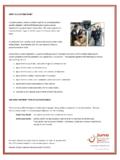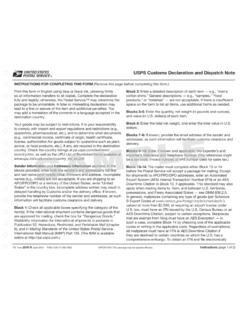Transcription of INTERNATIONAL MAIL IMPORTS Customs …
1 INTERNATIONAL mail IMPORTS . Customs Inspections of Mailed Parcels Contents Page All mail is subject to Customs examination X. Sending INTERNATIONAL packages from abroad X. Mailing vs. shipping X. Purchases sent by a merchant abroad X. Goods sent by the traveler or resident of a foreign country X. Getting packages from abroad X. Textile items X. Goods worth more than $2,000 X. Locating a missing or overdue package X. Failure to claim a parcel X. Importance of clear and complete declarations X. Assessing and paying duty X. Goods that may be entered duty-free X. Goods requiring duty X. Duty on multiple mailings of similar goods X. How to protest duty X. Duty waiver policy X. Shipments eligible for duty waivers X. Gifts X. United States products returned X. Articles acquired abroad and mailed home X.
2 Goods from insular possessions X. government employees: personal and household effects X. Goods for commercial vs. personal use X. Shipments not eligible for duty waivers X. Goods sent by courier services X. Improperly marked goods X. Articles ordered from military exchanges X. Tobacco and perfume valued over $5 X. Sending an article abroad for repair or alteration X. If you're not near a port X. Duty refunds on replacement articles X. Duty refunds on damaged articles X. Restricted and prohibited goods X. Medications and medical devices X. Ceramic tableware X. Goods that violate trademark or copyright protections X. Alcoholic beverages X. Other restricted/prohibited items X. Location of Customs INTERNATIONAL mail branches X. mail parcels must meet United States and INTERNATIONAL postal requirements regarding weight, size, and measurement.
3 All mail is subject to Customs examination The United States Customs territory consists of the 50 states, the District of Columbia, and Puerto Rico. In general, all mail originating outside United States Customs territory that is to be delivered inside Customs territory is subject to Customs examination. mail arriving from outside the Virgin Islands that is to be delivered inside the Virgin Islands is also subject to Customs examination. mail entering the United States from abroad arrives first at the Postal Service. The Postal Service then sends packages to Customs for examination and to assess duty, if indeed any is owed. Customs processing is required for civilian parcels as well as for those sent from overseas military postal facilities (APO/FPO). Sending INTERNATIONAL packages from abroad Mailing vs.
4 Shipping Although many travelers use the terms shipping and mailing interchangeably, they are not the same, especially not where clearing Customs is concerned. Mailing is always via the INTERNATIONAL postal system, which is run jointly by INTERNATIONAL governments. Shipping, on the other hand, refers to private-sector couriers, those commercial delivery services that often promise to deliver packages in record time. Commercial delivery services usually use Customs brokers or other agents to clear your merchandise through Customs , which is a service you pay for in addition to the charge for shipping and any duty or processing fees owed to the Customs Service. ( Customs brokers are not employees of the Customs Service.). If you mail your goods through the Postal Service, the only fees you may have to pay are a postal service handling fee and, if duty is owned on your package, a Customs handling fee.
5 You also have the option to protest a duty determination before duty is paid, rather than after as would be your situation if a courier service was handling your packages. Here's an example of how mailing vs. shipping can affect a package: Say you're shipping used personal goods back to the United States. Even though a commercial delivery service may require you to provide a complete description of the goods you are sending, that service's Customs broker may not make a distinction between new and used goods when clearing goods through Customs and will automatically pay whatever duty would be owed if the item was new. They, in turn, will bill you for reimbursement. Thus, you could be asked to pay duty on something you already owned that you are sending back to the United States. In order to avoid paying the duty, you will have to ask the courier service's broker to protest the duty payment with Customs , and they may charge you again for that service.
6 In any event, Customs recommends that if your goods are used personal goods returned, you indicate this on the outside of the package since this can significantly reduce the amount of duty, if any at all, that you are charged for the shipment. You should also be aware that because different clearance procedures and regulations may apply to mailed vs. commercially shipped packages, the information and guidance in this brochure apply only to goods entering the United States by way of the INTERNATIONAL mail system, and not to those shipped by commercial delivery services. 2. Warning If you misrepresent the nature of the goods you are sending back to the United States, whether by mail or commercial carrier, you may be liable for a penalty as well as any duty that might be owed on your merchandise.
7 In addition, those goods could be subject to seizure. Purchases sent by a merchant abroad The merchant will attach an INTERNATIONAL Customs declaration to your package, which he or she should fill out with a complete, accurate description of the parcel's contents and value. The merchant will then mail or ship the package to the address you supply. Although the merchant may charge you for the cost of mailing or shipping your package, he should not charge you for Customs duties. Customs duties are not assessed until a package arrives in the United States, and they cannot be paid in advance. If a merchant tells you that you must prepay duty, do not believe him or her. The Postal Service in the United States will collect any duty owed from the recipient; in fact, by law, only the designated recipient (addressee) is liable for duty.
8 The shipment's originator the merchant, for example will not be charged duty for goods that he or she has sent to the United States. Goods sent by the traveler or resident of a foreign country When you take your package to a foreign post office, the postal clerk will give you an INTERNATIONAL Customs declaration. Be sure to fill it out with a full, accurate description of the goods inside and attach it to the parcel's exterior. By INTERNATIONAL treaty, all foreign post offices will have this form. In the very unlikely case that one isn't available, simply write the description and value on the outer wrapping of the package itself. If the item is intended as a gift, write unsolicited gift on the outer wrapper. If the package contains your own used belongings, mark the package personal goods returned.
9 If the package contains new purchases you bought for your own use, mark it personal purchases.. Importance of clear and complete declarations Customs officers must do time-consuming, intrusive examinations of packages that lack readily accessible, easy-to-read information about the merchandise inside. Lack of clear, concise declarations could delay your package's arrival. Getting packages from abroad As stated earlier, when a package first enters the United States, it arrives at a post office near the addressee. That Post Office will route it to one of 13 Customs INTERNATIONAL mail facilities, where Customs inspectors will determine whether duty is owed. Customs then returns the package to the Postal Service for delivery (unless the value of the package is over $2000, in which case the package will be held by Customs until formal entry can be made).
10 If duty is owed, the Postal Service will collect it from the recipient before delivering the package. If the package is a gift worth more than $100, the recipient will be charged duty. (Please see the section on gifts starting 3. on page X.) The sender can reimburse the recipient for whatever duty he or she has paid; however, by Customs regulation, duty cannot be prepaid; in all cases, including gifts, the parcel's recipient bears responsibility for paying it. Textile items Sometimes sending textiles can be a little tricky because they are subject to more regulations than other kinds of consumer goods. For example, there may be quota restrictions for importing textiles whose value is more than $250. Formal Customs entries must be filed for all made-to-order suits from Hong Kong, no matter what the value, unless they accompany the traveler.






